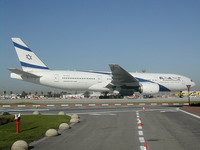Boeing Co promises no further delay in 787 Dreamliner test
Boeing Co. keeps up with the schedule for the 787 Dreamliner and promises no further delays in the much-ballyhooed airplane.

Officials of the aerospace company reaffirmed the latest schedule in a conference call updating the 787 program's status, two months after it pushed back flight testing and initial deliveries of the aircraft by six months.
Many industry observers ultimately anticipate additional delays, which are common with new airplanes.
Scott Carson, head of Boeing's Seattle-based commercial airplane manufacturing division, acknowledged the company still is "ironing out significant supply-chain wrinkles" but said there are no revisions to the latest schedule.
"The plan we announced in October for the 787 is unchanged: to fly the first airplane around the end of the first quarter of 2008 and begin deliveries in late November or December timeframe, and to deliver 109 airplanes in 2009," Carson said. "That is our team's commitment, and we intend to perform to that commitment."
The first flight test had been scheduled for early fall.
The 787, Boeing's first newly designed jet since airlines started flying the 777 in 1995, will be the world's first large commercial airplane made mostly of carbon-fiber composites, which are lighter, more durable and less prone to corrosion than more traditional aluminum. Boeing says it will be cheaper to maintain and offer better fuel efficiency and more passenger comforts than comparable planes flying today.
But the unprecedented plan to assemble a jet from components manufactured largely by other companies ran into early snags when the outsourcing led to a variety of problems involving contractors in numerous countries. It also was dogged by shortages of fasteners and other small parts that hold large sections of the plane together.
Pat Shanahan, who replaced Mike Bair as vice president and general manager of the Everett, Washington-based 787 program in October as a result of the production problems, said Boeing is "making progress against our plans." He said parts shortages are declining and availability of fasteners has improved, enabling installation work to accelerate.
But he appeared to leave the door open to a potential scaling back in the target of delivering 109 airplanes by the end of 2009 if everything doesn't go smoothly in the interim.
"There's no doubt our ramp-up is aggressive, but throughout this effort we have not found any fundamental flaws in our production system design that would lead me to believe it's not doable," Shanahan said.
"The key will be our ability and that of our partners to work through the front-end production issues and meet the component delivery schedules into final assembly. And of course the plan assumes no major unknowns are uncovered in flight test."
The program chief said the 787 team is applying more detailed processes than before and systematically working through the details of its challenges, such as mapping every open hole and fastener. Previously, he said, it had been "trying to brute-force through some of these obstacles thinking that they would break through more quickly."
Boeing has solved the "big problems" but remains frustrated by small details in the process, Shanahan said.
A key to meeting the timetable will come in late January when it completes remaining installation work and turns the aircraft's power on.
"Our schedule becomes much more predictable once we get the power on because the airplane is finally in the state that our factory was designed for," Shanahan said. "Once we have power on, we can perform basic integrated functional testing and then transition to" remaining testing, he said.
The delay highlights inherent problems in building new airplanes and risks slowing the momentum Boeing built up after years of lagging behind European rival Airbus, which itself stumbled in introducing its superjumbo A380 two years behind schedule.
It also has hurt the company's credibility on updates like the one made Tuesday, according to Lehman Brothers analyst Joseph Campbell.
"Because Boeing insisted there would be no 787 delay until well after most observers had concluded that a delay was certain, we think what Boeing says going forward carries less weight than it did a year ago," he said in an investor report issued Monday. "Unfortunately, no one, including it appears Boeing, really knows how the 787 program certification, production ramp-up and Boeing profit recognition will go."
Boeing shares, which topped $107 before the six-month delay was announced in October, fell $1.10 to $91.54 in afternoon trading.
Subscribe to Pravda.Ru Telegram channel, Facebook, RSS!





